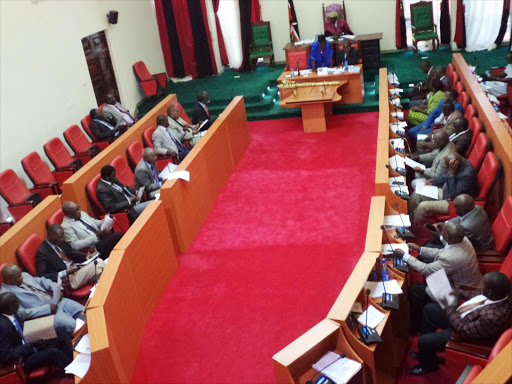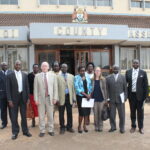Baringo County, located in Kenya’s Rift Valley region, is a diverse area known for its rich cultural heritage, beautiful landscapes, and economic potential. Governed by Benjamin Cheboi, who was elected on August 12th, 2022, under the United Democratic Alliance (UDA) party, the county is working to enhance service delivery and drive development through its leadership. This article presents an updated list of Baringo County’s ministers (CECs), their roles, and additional insights into their salaries and responsibilities.
Overview of Baringo County Government Structure
Baringo County’s governance structure includes 10 County Executive Committee members (CECs), each managing a specific portfolio that aligns with the county’s development goals. These CECs play a vital role in formulating and implementing policies, ensuring that the county government meets its mandate to provide essential services to residents. Here is a detailed look at the CECs and their respective roles.
List of Baringo County Government Ministers (CECs)
| Ministry | Minister (CEC) |
|---|---|
| Devolution, Public Service Management, and Administration | Peninah Bartuin |
| Youth, Gender, E-Government, and ICT | Maureen Karelo Lemashep |
| Finance and Economic Planning | Wilson Cheserek |
| Health Services | Solomon Sirma |
| Water, Irrigation, Environment, and Natural Resources | Richard Naaman Tamar |
| Transport, Public Works, and Infrastructure | Lekonaya Kibwalel |
| Education, Sport, Culture, and Social Services | Symon Kuita |
| Lands, Housing, and Urban Development | Ruben Rutto |
| Agriculture, Livestock Development, and Fisheries | Risper K. Chepkong’a |
| Industry, Commerce, Enterprise, and Cooperative Development | Zachary Kiprotich |
Roles and Responsibilities of the Baringo County CECs
Each CEC in Baringo County plays a significant role in the county’s progress:
- Devolution, Public Service Management, and Administration: Peninah Bartuin oversees the devolution process, ensuring that government services are decentralized effectively and that administrative functions are streamlined for better public service delivery.
- Youth, Gender, E-Government, and ICT: Maureen Karelo Lemashep focuses on the empowerment of youth and gender equity, while also spearheading e-government initiatives that aim to digitize services and improve the county’s ICT infrastructure.
- Finance and Economic Planning: Wilson Cheserek is responsible for financial management, budgeting, and economic planning, ensuring prudent use of resources and aligning expenditures with the county’s development priorities.
- Health Services: Solomon Sirma manages the county’s healthcare systems, working to improve access to medical services and ensuring that residents receive quality healthcare.
- Water, Irrigation, Environment, and Natural Resources: Richard Naaman Tamar handles water and irrigation projects, essential for supporting agriculture in this semi-arid region, and oversees environmental conservation initiatives.
- Transport, Public Works, and Infrastructure: Lekonaya Kibwalel is in charge of infrastructure development, including roads and public works, which are key to improving connectivity and economic activities in the county.
- Education, Sport, Culture, and Social Services: Symon Kuita focuses on enhancing educational facilities, promoting sports, and preserving the cultural heritage of Baringo County, contributing to the social well-being of residents.
- Lands, Housing, and Urban Development: Ruben Rutto manages land issues, housing projects, and urban planning, which are critical for orderly development and addressing the needs of a growing population.
- Agriculture, Livestock Development, and Fisheries: Risper K. Chepkong’a is responsible for advancing agricultural practices, supporting livestock development, and promoting fisheries, which are vital sectors for Baringo’s economy.
- Industry, Commerce, Enterprise, and Cooperative Development: Zachary Kiprotich focuses on fostering trade, supporting local enterprises, and promoting industrial growth to boost the county’s economic development.
Salaries of County Ministers (CECs) in Kenya
In Kenya, CECs earn a standardized salary as determined by the Salaries and Remuneration Commission (SRC). A CEC in Baringo County receives a monthly salary of Ksh 404,250. Here’s the breakdown:
| Component | Amount (Ksh) |
|---|---|
| Basic Salary | 242,550 |
| House Allowance | 45,000 |
| Market Adjustment | 81,700 |
| Total Salary Per Month | 404,250 |
This compensation is designed to reflect the responsibilities held by CECs, including the formulation of policies, overseeing key projects, and working closely with the governor to achieve the county’s strategic objectives.
Importance of CECs to Baringo County’s Development
The role of the CECs is fundamental to Baringo County’s socio-economic progress. Their efforts in various sectors help address the county’s challenges, including water scarcity, infrastructure gaps, and healthcare access. With Baringo’s potential in agriculture, livestock farming, and tourism, these leaders are instrumental in implementing strategies that can harness these resources for the county’s growth.
Under Governor Benjamin Cheboi’s leadership, Baringo County is on a path toward sustainable development, with a committed team of CECs driving key projects and policies. Their work is essential for improving the quality of life for residents, fostering economic opportunities, and ensuring that the county thrives within Kenya’s devolved government structure.
This comprehensive list of Baringo County’s CECs and their roles provides valuable insights into the county’s governance and is a useful reference for residents, stakeholders, and those interested in understanding how the county operates. As the county continues to develop, the leadership and direction provided by these ministers will be critical to its success.





